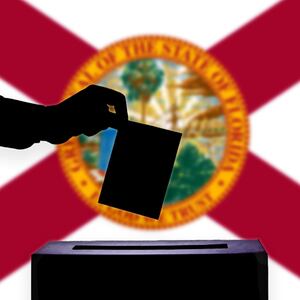When the people of Florida voted, by a nearly 2-to-1 margin, to allow former felons to vote in state and federal elections, progressives wondered how the state’s Republican-controlled legislature would respond.
Now we know.
After a series of trial balloons—ignoring the referendum, delaying its implementation—the Florida House of Representatives’ Criminal Justice Subcommittee voted Tuesday to throw a huge roadblock in its path. According to the bill, approved on party lines, felons would first have to pay any outstanding fines and fees before regaining the right to vote.
ADVERTISEMENT
While the condition may seem minor, in fact it creates an insurmountable obstacle for thousands of people the amendment was meant to help.
As approved by voters in November, Florida’s Amendment 4 requires the “automatic” restoration of voting rights to felons “who have completed all terms of their sentence, including parole or probation.” (It also excludes those “convicted of murder or a felony sexual offense.”)
Backers of the House bill say that fines and fees are part of the “terms of their sentence” which must be “completed” for restoration of voting rights to take place. Moreover, they point to statements by some voting rights activists that suggest that fines and fees are part of a criminal sentence.
But backers of Amendment 4 said that is simply not what the text says. Amendment 4 specifies the types of terms that are intended: not just prison, but parole and probation as well. If fines and fees had been included, then obviously they would have been mentioned as well, especially since they are less significant than probation.
Indeed, Florida voting rights activists have long maintained that no legislative action is necessary at all, because Amendment 4 is self-executing. Parole and prison are mentioned because they are to be included; whatever is not mentioned is excluded.
Moreover, such fees aren’t even part of the sentences imposed by judges. They’re administrative fees assessed by court clerks. (Judges only impose fines meant for restitution; those are part of the sentence itself.)
Most important is what this requirement would actually mean: blocking up to 80 percent of the 1.4 million former felons who were supposed to be allowed to vote.
As reported by WLRN in Miami, the vast majority of fines are never paid because those convicted are simply too poor to pay them. For example, between 2013 and 2018, over $1 billion in felony fines were issued, and only 19 percent were paid. Indeed, no one ever expects these fines to be paid. The state Court of Clerks association deemed 83 percent of the fines levied during that period to have “minimal collections expectations.”
Similarly, a 2010 Brennan Center for Justice report contained an estimate (no actual numbers are available) that approximately 80 percent of felons released from prison still owe fines, fees, and other financial obligations.
Why, then, are the fines even assessed?
Part of the answer is a 1998 constitutional amendment that required courts to be funded entirely by fines and fees—what some have called “cash register justice.” While such fees are assessed everywhere, only in Florida must the court system support itself entirely by this means.
In other words, the fines and fees are assessed because it’s the only way the courts can stay open. There’s no expectation that most of them will ever be paid, but courts—fees are generally assessed not by judges passing out sentences, but by court clerks—assess as much as possible, hoping they’ll net enough to survive.
Of course, no one in 1998 imagined that in 2019, the Florida legislature would make payment of such fees a condition to voting. Even clerks’ offices were taken by surprise.
In other cases, fines are simply mandated by law. As the WLRN report detailed, any conviction for drug trafficking—even a low-level, non-violent conviction—carries a mandatory fine of $25,000 to $500,000 per count.
Once again, no one expects people living at the poverty line to pay these fines—especially after their ability to find a job goes down following a felony conviction.
Worst of all, such fines are greatly inflated because of another Florida law that allows private debt collectors to tack on their commissions—between 25 percent and 40 percent of the underlying fine—onto the amounts due.
The net result of all this will disproportionately affect poor people and people of color. Already, felon disenfranchisement excludes more than 10 percent of the voting-age population overall, but more than 20 percent of black Americans. And of course those at or near the poverty line will have the hardest time paying these outstanding fees.
Critics have called the measure a poll tax.
Phil Telfayan, the executive director of Equal Justice Under the Law, said: “The United States as a country has gotten rid of the poll tax… What I’m really worried about with Amendment 4 is that Florida is going to take that turn where folks who can’t afford to pay their court debt are barred from the voting box.”
Kirk Bailey, political director of the ACLU of Florida, said in a written statement that the bill “is an affront to Florida voters who approved Amendment 4. If this bill passes, it will undoubtedly continue to disenfranchise those who have already served their time and paid their debt to society. This is exactly what we were worried about from the beginning—legislative attempts to undermine the will of the people who voted for second chances and to rid Florida of the last vestiges of its Jim Crow era past.”
The bill now goes to the state House of Representatives, where Republicans hold a 71-46 majority.





